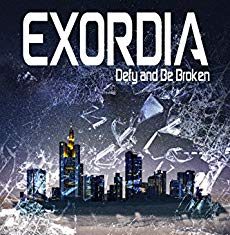4 stars ⭐⭐⭐⭐
For over 200 years, the colony of Exordia has carved out a peaceful, technological existence on a harsh, desert world light-years removed from Old Earth. But peace has come at a price. The sinister Pallagen corporation exerts a shadowy oppression over Exordia’s seemingly idyllic society. There are rumors of horrible experiments, of abductions in the dark of night. Men, women and children stripped of their very identities for the sake of stability and progress.
The sinister pallagen corporation exerts a shadowy oppression over exordia’s seemingly idyllic society.
Lena Ward once believed in Pallagen’s mission – until she saw its human cost. Now she wages a private war against her former employers, dedicated to exposing the truth behind their web of lies. But her crusade may soon cost her everything…
Alex Kleric has awakened in a colony hospital with no memory of her past and personal records that make no sense. She is inexorably driven to a dark secret she may regret uncovering…
Exordia is a science-fiction thriller with a dystopian theme and a minor element of space opera in the background. The setting is a partially-terraformed desert planet hosting a colony of ten cities. The opening establishes a gritty sense of atmosphere by introducing us to the seedy underbelly of this place. From there, further world-building is communicated through the characters with little to no reliance on canned exposition.
The narrative is both fast-paced and economical, shifting between a pair of dual subplots (Lena and Alex) that are ultimately resolved in an artful twist that plays with the reader’s awareness of time. I found the language and word-choices to be well-crafted with a few minor exceptions. The characters are largely well-drawn, and there is lots of humor and jokes, which will appeal to many readers but can sometimes drag down dramatic tension. The antagonist, Pallagen, is portrayed as a near-monolithic abstraction, which is both a strength and a weakness – the sense of inhumanity can make them seem unstoppable in a “force of nature” sense, but they also come off like a caricature at times. The actual members of the organization make only brief appearances and are never given personal names. It may have helped to include at least some scenes from their point of view.
The story of Exordia is a seemingly simple one that nevertheless packs in multiple layers of thematic meaning. At its heart is the idea of one person making a difference – much of the good we do is not immediately obvious and mistakes do not invalidate our efforts. Lena Ward’s character arc illustrates this beautifully. In Alex Kleric, we see the theme of perseverance – what is your response after seeming defeat? Do you simply give up or try again in a different way?
At its heart is the idea of one person making a difference – much of the good we do is not immediately obvious and mistakes do not invalidate our efforts.
Other philosophical themes are omnipresent throughout the book and can largely be drawn as parallel oppositions: the “good of the whole” vs. individual liberty, “progress” vs. human dignity, human life as a means to an end vs. an end in itself, and, ultimately, God’s law vs. man’s law. This last is briefly but tantalizingly illustrated through a group of desert outcasts exiled from the colony decades prior for their belief in the “Revelator.” I’ll be interested to see if we get more of their story in future installments.
I would recommend Exordia to anyone looking for an enjoyable read with lots of action that is still balanced with deeper themes. A great start by a first-time author!
Content Ratings:
Heat: None. One romantic subplot portrayed on strictly platonic lines.
Profanity: The author introduces two original terms as part of the world-building – “phaeting” (presumably a mild expletive) and “Revelator” (a reference to God). No other forms of profanity occur.
Violence: A fair amount of action-oriented violence, but none overly graphic. Some allusions to human experimentation.
Genre: Sci-Fi/Thriller
Age recommendation: 12 and up.
Availability: This book is available in Amazon.
Reviewed by A.K. Preston
A.K. Preston is the author of The Gevaudan Project, and has published short stories in The Unseen Anthology and The Untold Podcast (to be released sometime this year). You can find him at his website, AKPreston.com. In his spare time, he likes to read classic literature, history, and speculative fiction of all types.



 Dragon’s Future – Dragon Courage, Book One – Kandi J. Wyatt
Dragon’s Future – Dragon Courage, Book One – Kandi J. Wyatt
Leave a Reply